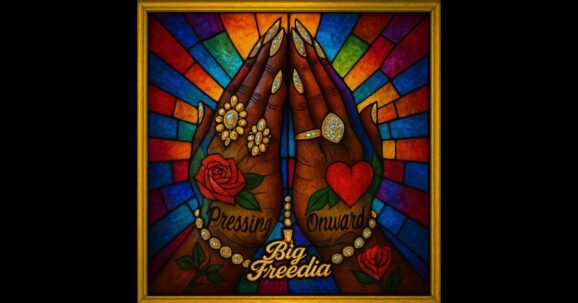Missouri-based folksinger Willi Carlisle is the living embodiment of Kris Kristofferson’s famous lines – “He’s a walking contradiction, partly truth and partly fiction.” Carlisle’s appeal is his ability to write deeply incisive, provocative, and socially relevant songs without being preachy, while taking a few lighthearted detours through these eleven songs on Winged Victory. Carlisle is serious without taking himself too seriously as he champions the weirdos, the outcasts, and the dreamers who find it increasingly difficult to thrive in our chaotic state. The liners contain a bold headline – “These Songs Feel Poised on the Edge of the Apocalypse.”
Carlisle opens with a cover written by an anonymous Industrial Workers of the World (IWW) worker, the sea shanty-like “We Have Fed You All For 1000 Years,” a direct assault on the wealth disparity that existed then, let alone now. He follows with the banjo-driven title track, where he rails against relentless progress, stating that no one is expendable and believing in the impossible is a worthy trait. Yet, this romp (or rant) ends in the last verse, where Carlisle sings in the dementia ward, stunned when the old folks sing back. There is a positive takeaway; however, the mind remembers music when many other memories are irretrievable.
Midway through the record, he has his own single, “Work Is Work,” making the point that after a certain level of creature comfort and stability, money doesn’t make one any happier. He accentuates those thoughts in “Sound and Fury,” poking fun and sarcasm at how meaningless production and profit can be, brought to head with “Well, I told you I was working on a building/Didn’t say what kind of building I was building/If you don’t like it, you can kick rocks/Just don’t kick the rocks of my building.”
Many of these songs, though, fall into the ‘partly fiction” category or at least calmer moments of relief. In the gently picked “Wildflowers Growin’,” he urges us to stop and appreciate the smaller things. In the context of these lyrics, Carlisle does what he does in some other songs too: lifts the well-worn lyrics of yore into the tune. In this case, “Yeah, I’m going back down where the weather suits my clothes.” In the accordion-laced ballad “The Cottonwood Tree,” he recalls childhood and his first memories of being free, paying it off with a brief instrumental polka. He also includes his cover of Richard Thompson’s masterful unrequited love song, “Beeswing,” a decent attempt, but one he should have left alone. Some songs are just sacred and shouldn’t be tampered with. We can’t blame him for loving the song, though.
There are character songs too. He renders a satirical take on queer country icon Patrick Haggerty’s “Cocksucking Tears.” He writes his laugh-out-loud character portrait in “Big Butt Billy,” a rhyming talking blues in the first person by a trucker who discovers his sexuality while flirting with a non-binary server at a diner. He concludes the album with a cover of folksinger Mark Ross’ “Old Bill PIckett,” the legendary Black cowboy, with the message that sharing our collective histories is the only meaningful way to make progress.
Musically, the album employs folk music conventions, old vaudeville sounds, bluegrass, and a hint of psychedelia to amplify the notion of chaos. Carlisle plays four different types of accordions and banjos in addition to fiddle, harmonica, guitars, and other instruments. Assisting are: Beth Chrisman (fiddle, guitar, vocals), Tony Kamel (acoustic guitar, mandolin, bouzouki, vocals), Lindsay Greene (upright bass), Hunter Burgamy (tenor banjo, tenor guitar), Oliver Steck (accordion, trombone, cornet), Tom Crell (tuba), Lynn Graulty (clarinet), Dees Stribling (drums), Ray Benson and Brennan Leigh (vocals).
Winged Victory is timeless folk music. Surely it addresses these times without being straight-out protest music but many of the themes are those we’ve heard in folk music through the last century. Carlisle is a clever wordsmith; you’ll find yourself referencing the lyrics in the booklet often. Even then, it may require repeated listens to fully appreciate his song craft.









5 Responses
Winged Victory is an album that reflects contemporary society, not afraid to address inequality, class, gender or personal pain
Listening to Willi Carlisle’s Winged Victory is like having a conversation with a friend who is both funny and insightful – he makes me laugh and then fall silent in a single song. I was particularly moved by the moment in the nursing home where music becomes a final memory – like Sprunki Retake, there are melodies that, though brief, touch the heart.
Listening to Winged Victory by Willi Carlisle is like having a conversation with a friend who is both funny and insightful – he makes you laugh and then fall silent in just one song.
Listening to Winged Victory by Willi Carlisle is like having a conversation with a friend who is both funny and insightful – he makes you laugh and then fall silent in just one song.
Carlisle opens with a cover written by an anonymous Industrial Workers of the World (IWW) worker, the sea shanty-like “We Have Fed You All For 1000 Years,” a direct assault on the wealth disparity that existed then, let alone now.